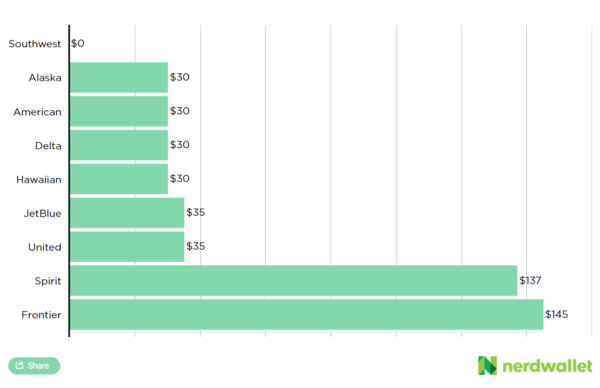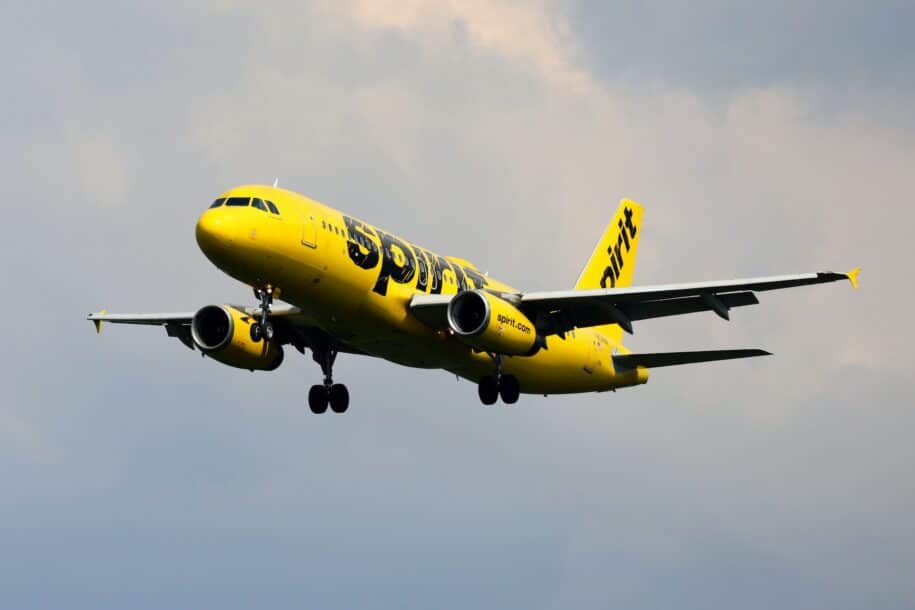Spirit Airlines and other ultra-low-cost carriers may claim to offer a great value, but their low cost model carries higher risk to you.
I’m so tired of frugality tips. I believe that if people spent as much time working to increase their income as they did trying to be frugal, people would be a lot better off, and I mean that literally.
For one, living in frugality builds a scarcity mindset. A scarcity mindset is a belief that there is not enough for you and everyone, that life is a zero sum game, and that there must be winners and losers.
It’s a mindset like this that not only can ground you in poverty, but also runs the risk of making you a Republican. It’s just not worth it.
Now, I can’t meaningfully affect the imbalanced transfer of wealth that goes on in our country. (Sorry.) So all I can do is help you recognize that the pursuit of cheapness, of spending less, not only doesn’t help your mindset, but it in many cases can cost you more money.
And nowhere is this more apparent than in the pursuit of cheap flights.
Table of Contents
Spirit Airlines
In the U.S. the cheapest flights are typically found on Spirit Airlines, an “ultra-low-cost carrier”, or ULCC as they say in the trade.
Now, I don’t want to pick on Spirit Airlines in particular here. That would be like picking on Dollar Tree over Dollar General. There are other airlines that serve this model, most notably Frontier Airlines in the U.S., and Ryanair and easyJet in Europe.
But since Spirit Airlines was arguably the forerunner and biggest proponent of the ultra-low-cost model here, one that other airlines are now copying, it makes sense to make an example out of them.
Air travel used to be better
Airline travel has been a race to the bottom for decades now, coincidentally, ever since the Airline Deregulation Act of 1978. (See a pattern forming here?)
Air travel used to be dignified, pleasant, exciting, and special.

But in recent decades, airlines have been attempting to move as far away from a pleasant experience as possible. Just look at the list of changes over the years:
- Checked luggage used to be free, and now almost all airlines charge
- Meals used to be served in coach, now some airlines don’t even have meals to pay for
- Seat pitch used to be 35 or even 36 inches, and now can be as tight as 29 inches
And no airline in the U.S. has enthusiastically attempted to squeeze (sometimes literally) the passenger more than Spirit Airlines.
“Great value”
Spirit Airlines advertises itself as being cheap. That’s really their main pitch. In their About page, the phrase “great value” appears first before everything else, while most of the rest of the pitch involves how this “great value” can allow travelers to travel more.
And if you take almost any city pair, Spirit will be significantly less than pretty much all other airlines, sometimes by a lot.

But hold up, because you have to pay for all that cheapness.
Extra fees
The following is a short list of extra fees you may need to pay when flying Spirit:
- Checked bags
- Carry-on bag
- Non-alcoholic drinks
- Check-in
- Boarding pass
- Seat selection
Spirit’s fees are more than four times the fees of other major airlines.

Your flight has been canceled
But even if you can eke out a cheaper fare, there is one way that Spirit falls down worse:
IRROPS.
That’s airline-speak for “irregular operations”, meaning when things go wrong.
Spirit Airlines runs a point-to-point network, as opposed to a hub-and-spoke network like other carriers, so when a Spirit plane doesn’t arrive when it’s supposed to, there aren’t backup planes sitting around that can be diverted to make things right.
Plus, Spirit has no codeshares with other airlines, so you can’t get routed onto United or American or any other airline.
When things go wrong, you’re basically on your own.
I can’t tell you how many times I’ve walked into an airport and seen a crowd of people looking not unlike a street market in Cairo. What happened? It’s always Spirit that canceled a flight, and everyone is delayed, angry, and out of luck.
In fact, in just researching for this article, I found a news article posted just this week, titled: “Spirit Airlines cancels dozens of flights to inspect some planes“. A single flight can disrupt hundreds of people. This was an airline canceling 11% of its scheduled flights in a single day!
What can people do about this? Not a lot. Call Spirit’s customer service hotline (if it exists) and hope that you can get on another flight. But because of the lack of codeshare, the chances of you being delayed a day or more are pretty high.
And that’s going to cost you.
And if they are cutting costs in inflight experience and customer service, can we be certain that they aren’t also cutting costs in airplane maintenance? Why are all of those planes out of service suddenly? That’s all I’m asking.
The airline prisoner’s dilemma
This is another example of the “prisoner’s dilemma” in economic terms. The prisoner’s dilemma, if you’re not familiar, states that individuals acting in their own best interest do not produce an optimal outcome for the whole group.
Spirit has become a model airline in the U.S. because of its profitable business model. (Yes, Spirit is profitable, and for years it was the most profitable airline in the U.S.) Entire airlines have shifted their whole business model to be more like Spirit’s. Frontier Airlines, used to be a normal airline before it saw greater profitability by being a ULCC, and subsequently jettisoned most of its amenities.
But even the big airlines are taking notice. You will doubtlessly have noticed that airlines haven’t exactly been adding more generous benefits over the years. (About the only exception to that is the lack of change fees due to the pandemic, but who knows how long that will last.)
Why are airlines copying Spirit’s model? Because through Spirit’s popularity, we are seeing that people value low prices over basically everything else: comfort, quality, timeliness, and maybe even safety.
This creates a self-perpetuating race to the bottom, where airlines cut costs and service, which leads more people to buy those no-frills flights, which leads airline to cut more costs and more service.
What can you do?
Complaining about Spirit Airlines is kind of a national pastime, it seems.
But I don’t like that. Complaining about something that you still use is the worst form of promotion. It gives free positive and negative advertising. Don’t do that.
So the most important thing to do when buying flights is to not put cost as the most important factor in your flights. As in: Don’t buy the cheapest flight.
We all want to become clear about the other aspects of flying that we value, beyond just price. Do we value reliability? Do we value amenities? What about convenience? As in, do we value anything beyond just raw dollars spent? (Would your answer change if you knew there was a chance your flight would be canceled?)
All of the above are reasons not to fly Spirit, or any other ultra low-cost airline.
Let your spirit break free
I know we’ve all been squeezed by our inequitable society to believe that we need to cut as many costs as possible, and do the cheapest things we can.
But, as I learned with dollar stores, there is a high cost to frugality. It can cost you more, and in ways different from how you’d expect.
The more that we “vote with our dollars” and show airlines that we value more than just the bottom line, the more we can entice airlines to change their tactics.
And even if we don’t make that kind of change, we’ll still have a more pleasant flying experience. It is possible, and you don’t need to fly First Class to get it.
I’ve been flying on Alaska Airlines for years now, and while I bet I could have saved some money if I had flown Spirit, I guarantee that I wouldn’t have had as good an experience as I’ve had.
Just because something is cheap, doesn’t mean it’s the better choice. Because, when it comes down to it, I really just want you to have a pleasant flight.



